英语插入语六大用法小结
(完整word版)高中英语英语插入语用法详解
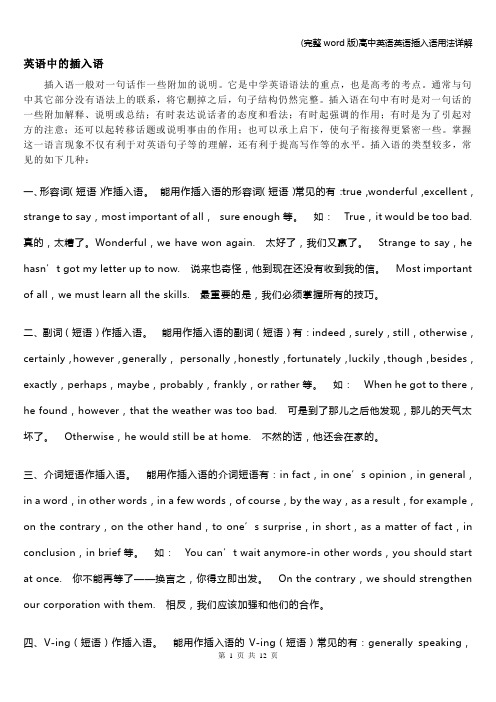
英语中的插入语插入语一般对一句话作一些附加的说明。
它是中学英语语法的重点,也是高考的考点。
通常与句中其它部分没有语法上的联系,将它删掉之后,句子结构仍然完整。
插入语在句中有时是对一句话的一些附加解释、说明或总结;有时表达说话者的态度和看法;有时起强调的作用;有时是为了引起对方的注意;还可以起转移话题或说明事由的作用;也可以承上启下,使句子衔接得更紧密一些。
掌握这一语言现象不仅有利于对英语句子等的理解,还有利于提高写作等的水平。
插入语的类型较多,常见的如下几种:一、形容词(短语)作插入语。
能用作插入语的形容词(短语)常见的有:true,wonderful,excellent,strange to say,most important of all,sure enough等。
如:True,it would be too bad. 真的,太糟了。
Wonderful,we have won again. 太好了,我们又赢了。
Strange to say,he hasn’t got my letter up to now.说来也奇怪,他到现在还没有收到我的信。
Most important of all,we must learn all the skills. 最重要的是,我们必须掌握所有的技巧。
二、副词(短语)作插入语。
能用作插入语的副词(短语)有:indeed,surely,still,otherwise,certainly,however,generally,personally,honestly,fortunately,luckily,though,besides,exactly,perhaps,maybe,probably,frankly,or rather等。
如:When he got to there,he found,however,that the weather was too bad. 可是到了那儿之后他发现,那儿的天气太坏了。
插入语用法

英语插入语用法详解插入语一般对一句话作一些附加的说明。
它是中学英语语法的重点,也是高考的考点。
掌握这一语言现象不仅有利于对句子、篇章的理解,而且也有助于提高书面表达的写作水平。
一、常见的插入语有形容词(词组)、副词、不定式、现在分词短语、介词短语、从句以及固定短语。
1.常见的形容词(词组)、副词作插入语的有:sure enough(果然); strange; worsestill(更糟糕的是);most important(最重要的是); honestly; obviously; however; otherwise; luckily; unfortunately; besides; first; second; especially; surprisingly等。
例如:Worse still, the lion could even carry off the baby in its mouth.We must do the experiment carefully; otherwise you'll get another result. Honestly, I don't need it at the moment.He likes the country, especially in spring.2.常见的不定式有:to tell the truth; to be short(简单地);to begin with(首先); to be sure(自然、当然、果然);to be honest/frank; to make things worse; to make a long story short; to speak of(值得一提的是),to be fair ,to sum up(概括地说) 等。
这些插入语表示说话人的态度,在句子中作独立成份。
例如:________ the truth, this is all Greek to me.A. TellB. To tellC. TellingD. Told [Key: B]That's a good idea, to be sure!To make things worse, many of the men have gone off to cities in search of higher pay.3.常见的现在分词短语有:generally speaking; frankly speaking; judging from/by; talking of(谈到); considering(考虑到,因为是);putting it mildly(说得客气一点)等。
插入语的类型及其用法

插入语的类型及其用法插入语是一种附加成分,往往被人们所忽视。
但它富于表现力,能使语言丰富多彩,准确鲜明。
插入语的位置也较灵活,可以置于句首、句中或句末。
下面就其类型和用法谈谈自己的粗浅认识。
一、根据插入语的构成形式可分为8种类型,举例说明如下:1.“主语+及物动词”型:I think(suppose)我想,我认为;I believe我相信;I guess我猜;I hope我希望;You know你知道;You see你瞧,你明白;I wonder我想知道。
如:This,I think,is a good way to learn English.我想这是学习英语的好办法。
It belongs to me,you know.你要明白,这是我的。
2.介词短语型:in fact事实上;to one’s surprise(sorrow,amazement,joy)使人感到惊奇(悲伤、惊愕、高兴)的是;by the way顺便提一下;in other words换句话说。
如:To her surprise.she found herself in a different world.使她吃惊的是,她发现自己处在另一个世界。
By the way,have you seen the film Romance of the Three Kingdoms?顺便问一下,你看过《三国演义》这部影片吗?3.形容词引起的短语:sure enough果然;worst’still更糟糕的是;most important of all 更重要的是;most curious of all最为奇怪的是;strange真奇怪。
如:Strange.he often forgot to turn off the lights.真奇怪,他经常忘记关灯。
Sure enough,he came again the next day.果然他第二天来了。
英语插入语的位置与用法

英语插入语的位置与用法英语插入语是指在句子中添加的一些附加信息,通常用来强调某个词或表达某种情感。
插入语在句子中的位置和用法对句子的理解和表达起着重要的作用。
本文将探讨英语插入语的位置和用法。
一、插入语的位置插入语可以出现在句首、句中或句末,具体位置取决于插入语的类型和句子的结构。
1. 插入语出现在句首插入语出现在句首时,常常用逗号将其与句子的主体部分分隔开来。
例如:- Honestly, I don't think he will come to the party.(老实说,我认为他不会来参加派对。
)- Fortunately, we managed to finish the project on time.(幸运的是,我们及时完成了这个项目。
)2. 插入语出现在句中插入语出现在句中时,通常用逗号或括号将其与句子的其他部分隔开。
例如:- My brother, by the way, is studying abroad.(顺便说一下,我弟弟正在国外留学。
)- The weather, it seems, is going to be sunny tomorrow.(天气似乎明天会晴朗。
)3. 插入语出现在句末插入语出现在句末时,往往用逗号将其与句子其他部分分隔开来。
例如:- She should have apologized for her behavior, in my opinion.(我认为她应该为她的行为道歉。
)- He is a talented musician, no doubt.(毫无疑问,他是个有才华的音乐家。
)二、插入语的用法插入语可以用来表达情感、补充信息或进行解释等。
以下是常见的插入语用法:1. 表达情感插入语可以用来表达人们的情感或态度。
例如:- Oh, I'm so excited about the upcoming trip!(哦,我对即将到来的旅行太兴奋了!)- Alas, we lost the game again.(唉,我们又输了比赛。
英语插入语
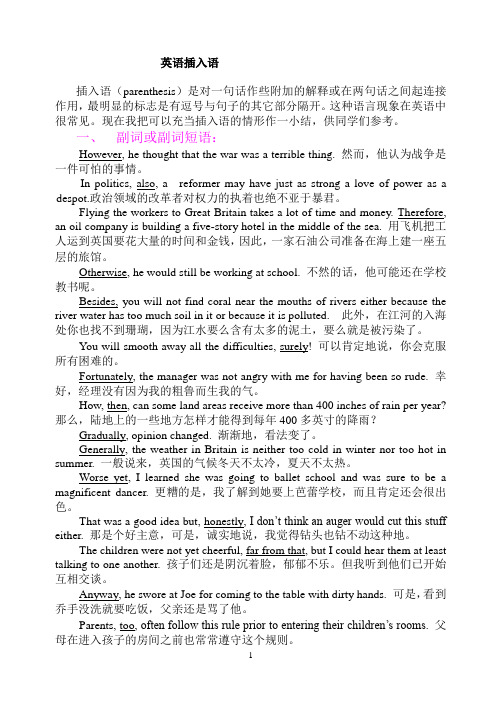
英语插入语插入语(parenthesis)是对一句话作些附加的解释或在两句话之间起连接作用,最明显的标志是有逗号与句子的其它部分隔开。
这种语言现象在英语中很常见。
现在我把可以充当插入语的情形作一小结,供同学们参考。
一、副词或副词短语:However, he thought that the war was a terrible thing. 然而,他认为战争是一件可怕的事情。
In politics, also, a reformer may have just as strong a love of power as a despot.政治领域的改革者对权力的执着也绝不亚于暴君。
Flying the workers to Great Britain takes a lot of time and money. Therefore, an oil company is building a five-story hotel in the middle of the sea. 用飞机把工人运到英国要花大量的时间和金钱,因此,一家石油公司准备在海上建一座五层的旅馆。
Otherwise, he would still be working at school. 不然的话,他可能还在学校教书呢。
Besides, you will not find coral near the mouths of rivers either because the river water has too much soil in it or because it is polluted. 此外,在江河的入海处你也找不到珊瑚,因为江水要么含有太多的泥土,要么就是被污染了。
You will smooth away all the difficulties, surely! 可以肯定地说,你会克服所有困难的。
Fortunately, the manager was not angry with me for having been so rude. 幸好,经理没有因为我的粗鲁而生我的气。
谈谈英语插入语的用法

学法新探插入语,不作句子任何成分,属于独立成分,即使将其删除,所在句子结构仍不会受影响。
它位置灵活,可以居于句首、句中或句末,常以逗号隔开,主要对句子起说明、解释、补充、强调、总结等作用,或表达说话者的看法或态度倾向,或引起听话者的注意,或转移话题等,是英语中一个“神奇”的语法知识点。
对此,笔者对高中英语插入语的用法进行了剖析,以期同学们能够准确地掌握和应用。
一、副词作插入语在英语中,有许多副词可以用作插入语,它们可以位于句首、句中或句末,以便对整句话起到解释、说明的作用。
常见的副词插入语有:honestly (老实说),luckily (幸运的是),fortunately (幸运的是),surely (简单的是),briefly (简而言之),certainly(无疑地),exactly (确切地说),personally (就本人而言),generally (一般地),obviously (明显地),apparently (显然地),frankly (坦率地说),incidentally (顺便提一下),essentially (实质上)等。
例如:①I do feel for you,honestly.老实说,我真的很同情你。
②Personally ,I ’ve always preferred Chinese food.就我个人来讲,我总是偏爱中国菜。
③Fortunately,my friend saw that something was seriously wrong .幸运的是,我的朋友发现了存在非常严重的错误。
④Pets ,certainly,can help children develop friend-ship skills.毫无疑问,宠物能够帮助孩子们培养交友技能。
在运用副词作插入语时,需要注意它与状语的区别。
一般地,副词作插入语,修饰整个句子,有逗号隔开;而副词作状语,则用来修饰形容词或动词,无逗号隔开。
(完整)英语插入语用法大全,推荐文档

英语插入语的用法大全在日常交际用语和书面表达中,插入语频频出现。
英语中的插入语(Parenthesis)是插在句子中的一个词,短语或从句,通常被逗号、破折号或句子的其他部分隔开,它与句子的其他部分之间没有语法上的关系,因此,有的语法学家将其归为独立成分。
插入语在句中通常是对一句话的一些附加解释,说明或总结;有时表示说话者的态度和看法;有时起强调的作用;有时是为了引起对方的注意;还可以起转移话题或说明事由的作用;也可以承上启下,使句子与前面的语句衔接的更紧密一些。
插入语大致可分为以下10种类型:1. 形容词或形容词短语作插入语如:worst still, sure enough, strange, most important of all等。
Strange, there is nobody in the classroom. 很奇怪,教室里没人。
2. 副词或副词短语作插入语如:personally, honestly, fortunately, luckily, for us, though, besides, exactly, surely, frankly, still otherwise 等。
Luckily for you, I happen to have the key.你很运气,我正好带了钥匙。
3. 介词短语作插入语如:of course, in short, as a matter of fact, by the way, on the other hand, in my opinion, in conclusion等。
In short, we should not stop halfway.简言之,我们不能半途而废。
As a result, they suffered heavy losses.结果,他们受到了严重损失。
On the contrary, we should strengthen our ties with them.相反,我们还应加强和他们的联系。
英语插入语的用法小结

英语插入语的用法小结高考英语插入语及插入句的用法由于插入语通常与句中其它成分没有语法上的关系,因此给考生的理解带来一定困难.插入语多半用逗号与句子隔开,用来表示说话者对句子所表达的意思的态度.插入语可能是一个词、一个短语或一个句子。
一、常用做插入语的副词indeed的确,surely无疑,however然而,obviously显然,frankly坦率地说,naturally 自然,luckily (或happily)for sb.算某人幸运, fortunately幸好, strangely奇怪,honestly真的, briefly简单地说等。
1。
Surely,she won't go to China Telecom with you。
当然她不会和你一起去中国电信。
2。
Strangely,he has not been to China Unicom. Still more strangely,he has not called me。
奇怪,他未来过中国联通。
更奇怪,他没给我打电话。
3. Fortunately,I found the book that I'd lost.幸亏我找到了已丢失的那本书。
二、常见的作插入语的形容词或其短语true真的,funny真可笑, strange to say说也奇怪,needless to say不用说,most important of all最为重要,worse still更糟糕的等.1。
Strange to say (或True),2。
he should have done such a thing。
说也奇怪(或真的),他竟然做出这样的事。
2 Most important of all,you each overfulfiled your own task。
更为重要的,你们各自超额完成了自己的任务。
三、常用作插入语的介词短语in a few words(或in sum,in short)简而言之,in other words换句话说,in a sense在某种意义上,in general一般说来, in my view在我看来,in his opinion(judgment)按照他的意见(判断),in conclusion总之, in summary概括地说,in fact事实上,in the first place 首先,in addition此外, of course当然, to our knowledge据我们所知, to my joy(delight,satisfaction)使我欣慰(高兴、满意)的, to their surprise(astonishment,amazement)使他们惊奇的, to her regret (disappointment)使她遗憾(失望)的,for instance(或example)例如,as a matter of fact事实上等。
高中英语插入语用法详解
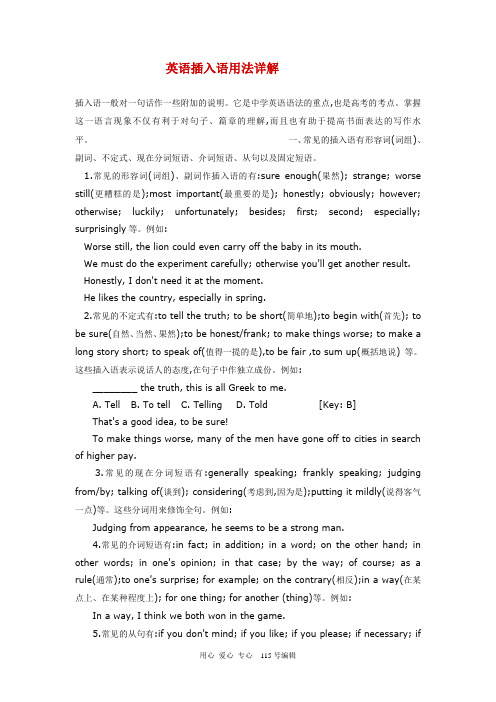
英语插入语用法详解插入语一般对一句话作一些附加的说明。
它是中学英语语法的重点,也是高考的考点。
掌握这一语言现象不仅有利于对句子、篇章的理解,而且也有助于提高书面表达的写作水平。
一、常见的插入语有形容词(词组)、副词、不定式、现在分词短语、介词短语、从句以及固定短语。
1.常见的形容词(词组)、副词作插入语的有:sure enough(果然); strange; worse still(更糟糕的是);most important(最重要的是); honestly; obviously; however; otherwise; luckily; unfortunately; besides; first; second; especially; surprisingly等。
例如:Worse still, the lion could even carry off the baby in its mouth.We must do the experiment carefully; otherwise you'll get another result. Honestly, I don't need it at the moment.He likes the country, especially in spring.2.常见的不定式有:to tell the truth; to be short(简单地);to begin with(首先); to be sure(自然、当然、果然);to be honest/frank; to make things worse; to make a long story short; to speak of(值得一提的是),to be fair ,to sum up(概括地说) 等。
这些插入语表示说话人的态度,在句子中作独立成份。
例如:________ the truth, this is all Greek to me.A. TellB. To tellC. TellingD. Told [Key: B]That's a good idea, to be sure!To make things worse, many of the men have gone off to cities in search of higher pay.3.常见的现在分词短语有:generally speaking; frankly speaking; judging from/by; talking of(谈到); considering(考虑到,因为是);putting it mildly(说得客气一点)等。
插入语用法
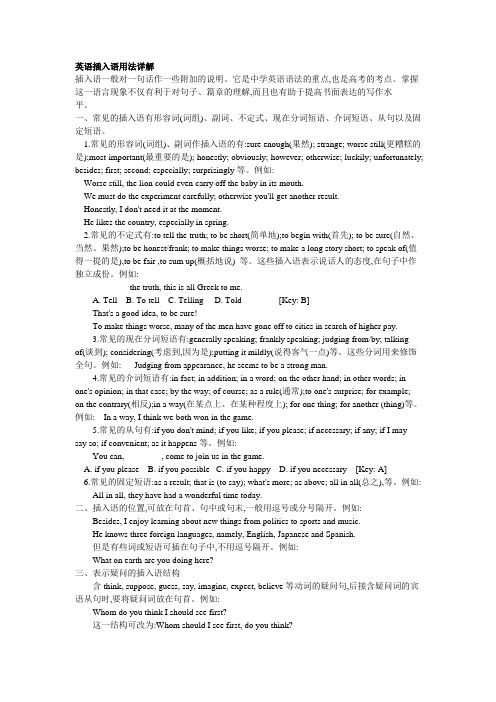
英语插入语用法详解插入语一般对一句话作一些附加的说明。
它是中学英语语法的重点,也是高考的考点。
掌握这一语言现象不仅有利于对句子、篇章的理解,而且也有助于提高书面表达的写作水平。
一、常见的插入语有形容词(词组)、副词、不定式、现在分词短语、介词短语、从句以及固定短语。
1.常见的形容词(词组)、副词作插入语的有:sure enough(果然); strange; worse still(更糟糕的是);most important(最重要的是); honestly; obviously; however; otherwise; luckily; unfortunately; besides; first; second; especially; surprisingly等。
例如:Worse still, the lion could even carry off the baby in its mouth.We must do the experiment carefully; otherwise you'll get another result.Honestly, I don't need it at the moment.He likes the country, especially in spring.2.常见的不定式有:to tell the truth; to be short(简单地);to begin with(首先); to be sure(自然、当然、果然);to be honest/frank; to make things worse; to make a long story short; to speak of(值得一提的是),to be fair ,to sum up(概括地说) 等。
这些插入语表示说话人的态度,在句子中作独立成份。
例如:________ the truth, this is all Greek to me.A. TellB. To tellC. TellingD. Told [Key: B]That's a good idea, to be sure!To make things worse, many of the men have gone off to cities in search of higher pay.3.常见的现在分词短语有:generally speaking; frankly speaking; judging from/by; talkingof(谈到); considering(考虑到,因为是);putting it mildly(说得客气一点)等。
高中英语知识点归纳非谓语动词作插入语
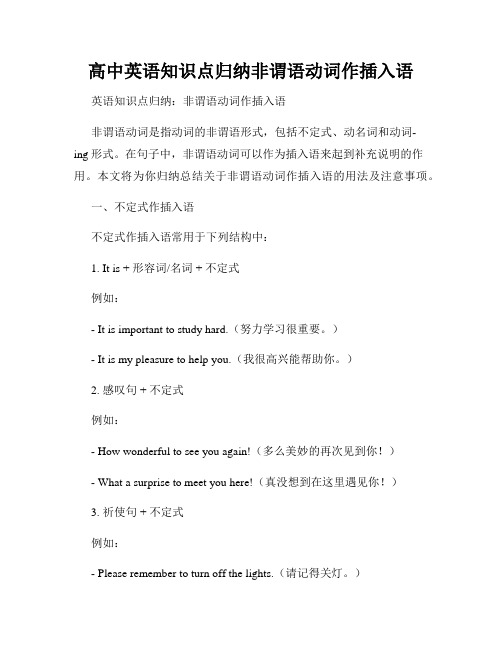
高中英语知识点归纳非谓语动词作插入语英语知识点归纳:非谓语动词作插入语非谓语动词是指动词的非谓语形式,包括不定式、动名词和动词-ing形式。
在句子中,非谓语动词可以作为插入语来起到补充说明的作用。
本文将为你归纳总结关于非谓语动词作插入语的用法及注意事项。
一、不定式作插入语不定式作插入语常用于下列结构中:1. It is + 形容词/名词 + 不定式例如:- It is important to study hard.(努力学习很重要。
)- It is my pleasure to help you.(我很高兴能帮助你。
)2. 感叹句 + 不定式例如:- How wonderful to see you again!(多么美妙的再次见到你!)- What a surprise to meet you here!(真没想到在这里遇见你!)3. 祈使句 + 不定式例如:- Please remember to turn off the lights.(请记得关灯。
)- Don't forget to bring your passport.(别忘记带护照。
)注意:不定式作插入语时,一般要放在句子的前面或者中间,用逗号隔开。
但如果不定式表示目的或结果时,可以放在句子后面。
二、动名词作插入语动名词作插入语常用于下列结构中:1. It is no use/ good/ worth + 动名词例如:- It is no use crying over spilled milk.(覆水难收。
)- It is worth visiting the Great Wall.(值得去参观长城。
)2. 感叹句 + 动名词例如:- How exciting swimming in the ocean!(在海里游泳多么刺激呀!)- What a pleasure seeing you again!(多么高兴再次见到你!)3. 祈使句 + 动名词例如:- Keep practicing speaking English.(保持练习说英语。
谈谈几种常见插入语的用法

and cheer up the old people.
Personally, the biggest challenge last year was the
总之,插入语的形式多样,在平时英语学习中,同
学们要注意对插入语进行归纳总结,从而丰富语言积
英语篇
康、富有和聪明的未来。
毫无疑问,北京最有代表性的文化标志是紫禁
skills, we will lead a happier and healthier life.
在我看来,
父母的支持和帮助是必要的,但我们不
能,我们将会过上更加幸福、
健康的生活。
are necessary, but we shouldn’
t be spoiled.
总之,如果我们尽最大的努力提高这些生活技
陈
定语从句作为高中英语三大从句——名词性从
句,状语从句和定语从句中之一,是高考必考的知识
霞
被修饰的名词 book 就是先行词。
二、分类
点。那么,怎样才能掌握定语从句的用法呢?笔者
定语从句分为限制性定语从句和非限制性定语
主要从定语从句的概念、分类、关系代词和关系副词
从句。限制性定语从句没有用逗号隔开,主句和从
fact(事实上), by the way(顺便提一下),to one’s surprise/
amazement(令人惊讶的是), on the contrary(恰恰相反)
等。例如:
It’s not difficult. On the contrary,
it’
s quite easy.
这并不难,恰恰相反,它容易得很。
例如:This is a book whose cover is yellow.
插入语用法知识点总结

插入语用法知识点总结插入语是英语中一种常见的修辞手法,用于在句子中插入额外的信息,以增强表达的丰富性和准确性。
插入语通常由逗号、破折号、括号或冒号等标点符号包围,它可以用于说明、解释、强调或提醒某个具体的事实或观点。
在本文中,我们将对插入语的用法进行总结,以帮助读者更好地理解和运用这一语法结构。
1. 前插语前插语位于主句之前,常用逗号将其与主句分隔开。
它可以用于提供额外信息、强调某个观点或引起读者的注意。
示例1:"Interestingly, the experiment yielded unexpected results.""有趣的是,这个实验得出了意想不到的结果。
"示例2:"In my opinion, we should focus on environmental protection.""依我之见,我们应该把重点放在环境保护上。
"2. 后插语后插语位于主句之后,同样用逗号与主句隔开。
它常用于补充说明、强调或提醒读者特定的观点或信息。
示例1:"He studied all night, exhausted.""他熬了一整夜,筋疲力尽。
"示例2:"She is an amazing pianist, as we all know.""众所周知,她是一位了不起的钢琴家。
"3. 补充语补充语可以进一步阐述或补充前面提到的事实或观点,常用括号或破折号将其包围。
示例1:"I finally arrived on time for the meeting (after getting stuck in traffic).""我终于及时赶到了会议现场(在堵车后)。
"示例2:"Tom - my best friend - helped me with the project.""汤姆(我的最好朋友)帮我完成了这个项目。
英语中插入语的用法和分类详解

英语中插入语的用法和分类详解(最新版)编制人:__________________审核人:__________________审批人:__________________编制单位:__________________编制时间:____年____月____日序言下载提示:该文档是本店铺精心编制而成的,希望大家下载后,能够帮助大家解决实际问题。
文档下载后可定制修改,请根据实际需要进行调整和使用,谢谢!并且,本店铺为大家提供各种类型的经典范文,如词性大全、句法大全、句型大全、从句大全、时态大全、语态大全、语法大全、虚拟语气、用法辨析、其他资料等等,想了解不同范文格式和写法,敬请关注!Download tips: This document is carefully compiled by this editor.I hope that after you download it, it can help you solve practical problems. The document can be customized and modified after downloading, please adjust and use it according to actual needs, thank you!In addition, this shop provides you with various types of classic sample essays, such as part of speech, syntax, sentence pattern, clause, tense, voice, grammar, subjunctive, usage analysis, other materials, etc. If you want to know the different formats and writing methods of the model essay, please pay attention!英语中插入语的用法和分类详解第一、常用作插入语的副词有:indeed(的确),certainly(当然),surely(无疑地),however(然而)等His spoken English is very good,indeed. 他的英语口语的确很好第二、形容词以及词组作插入语Strange to say,she hasn't got my letter up to now.说也奇怪,她到现在还没有接到我的信第三、常用作插入语的介词短语有:in short(简言之),of course (当然),in general(一般说来),in fact(事实上),in other words(换句话说),in a word(总之),in a few words(简言之)等In other words,he refused to accept your invitation.换句话说,他拒绝接受你的邀请第四、常用作插入语的分词短语有:strictly speaking(严格地说),generally speaking(一般地说),judging from...(根据...判断)等Generally speaking,boys are not so quiet as girls.一般说来,男孩没有女孩那么安静第五、常用作插入语的不定式短语有:so to speak(可说是),to be sure(无疑地),to sum up(概括地说),to tell the truth(老实说)等To sum up,success results from hard work.概括地说,成功说艰苦的结果第六、插入句作插入语的有:I am sure(可以肯定地说),I believe(我相信),I think(我想),I suppose(我猜想)等He will come to my birthday party,I suppose.我猜想,他会来参加我的生日聚会第七、以一般疑问句形式构成的插入语用于特殊疑问句中How do you think heat is different from temperature?你认为热和温度有什么不同?从上面这个句子可以看出,插入句都以一般疑问句的形式出现,插在疑问句之后,而特殊疑问句本身的主语、谓语仍用陈述句的语序,没有倒装句现象。
插入语用法归纳

插⼊语⽤法归纳插⼊语⽤法归纳插⼊语⽤法很多,在句⼦中的位置⽐较灵活,在学习中应当认真去体会。
⼤体⽽⾔,插⼊语可以分为以下⼏类:1. ⽤简短的句⼦结构作插⼊语。
这类短语有:I think, I hope, I guess, I believe, I suppose, I wonder, I tell you, I say, I'm afraid, I'm sure, you see, you know, as you know, that is, that is to say, what's more等等,它们可以置于句中或句尾。
如:I suggest you choose someone who you think is kind and friendly.This diet, I think, will do good to your health.It won't be raining long, I hope.You will have to work harder, you know, if you want to succeed.2. 副词或副词短语⽤作插⼊语,这类插⼊语⼀般放在句⾸或句尾。
如:Happily for him, his father's second wife was kind to him too.You'll be able to pass the coming exam, surely.Luckily for him, he didn't hurt in the accident.Honestly, I don't need it at the moment.3. 介词或介词短语作插⼊语,这类插⼊语⼀般放在句⾸,有时也可放在句中。
如:Like most of my schoolmates, I have neither brothers nor sisters-in other words, I'm an only child.By the way, Bob sends his best wishes.On the other hand, I didn't know you were there.In short, things have begun to improve since schools were called on to reduce learning load.4. 分词短语作插⼊语。
插入语的习惯用法

英语插入语1.介词短语用作插入语常作插入语的介词短语有:in fact(事实上),in one’s opinion(在某人看来),of course(当然),above all /first of all (首先),by the way (顺便)等。
如:Above all, you must follow your teacher’s advice. As a result, we must water the crop fields. In my opinion, he is an honest boy.2.副词用作插入语常作插入语的副词有:certainly(当然),surely(无疑),indeed(的确),however(然而),fortunately(幸运的是),luckily(幸运的是),probably(大概),personally(就个人来讲)等。
如:Unfortunately, I was caught in the rain. Perso nally, I’d rather go to the opera theatre. Surely, you must finish the task by di3.不定式作插入语常作插入语的不定式有:to be frank(坦率地说),to tell(you )the truth(老实说),to be sure(当然)等。
如:To tell you the truth, I didn’t want to go with you.4.V-ing 分词短语作插入语常作插入语的V-ing分词短语有:generally speaking(一般来讲),generally considering(一般认为),strictly speaking(严格地说),judging from/by (根据……来判断)等。
如:Judging from your accent , you must be from England. Generally speaking, this is a rule for protection our school.5.分句作插入语常作插入语的分句有:I think(我认为),I hope (我希望),I’m aftaid(恐怕),What’s more(而且),What’s worse(更糟的是),You see (你清楚)等。
- 1、下载文档前请自行甄别文档内容的完整性,平台不提供额外的编辑、内容补充、找答案等附加服务。
- 2、"仅部分预览"的文档,不可在线预览部分如存在完整性等问题,可反馈申请退款(可完整预览的文档不适用该条件!)。
- 3、如文档侵犯您的权益,请联系客服反馈,我们会尽快为您处理(人工客服工作时间:9:00-18:30)。
在英语学习中,插入语是一个比较重要的知识点。
因为插入语是一种独立成分,通常与句中其他成分没有语法上的关系,很多同学在学习过程中会有一定的困难。
其实,插入语大都是对一句话实行附加说明或解释,通常由一个词、一个短语或一个句子构成,常置于句首、句中或句末,一般用逗号或破折号与句子隔开。
下面举例归纳插入语的几种用法。
例1 _____the more expensive the camera,the better its quality.
A.General speaking
B.Speaking general
C.Generally speaking
D.Speaking generally
解析:本题答案为C.generally speaking为分词短语,意思是“一般来说”,在句中用作插入语。
小结:很多分词短语能够用作插入语,这样的分词短语有:strictly speaking(严格地说),generally considering(一般认为),judging from……(根据……判断)等。
例2 Two middle-aged passengers fell into the sea. ____,neither of them could swim.
A.In fact
B.Luckily
C.Unfortunately
D.Naturally
解析:本题答案为C.unfortunately为副词,意思是“令人遗憾地,不巧,可惜”,在句中用作插入语。
小结:常用作插入语的副词或副词短语有:indeed(的确),surely(无疑),however(不过),frankly(坦率地说),obviously(显然),naturally(天然地),luckily (happily)for sb.(算某人幸运),fortunately(幸好),strangely(奇怪),briefly(简单地说)等。
例3 Your performance in the driving test didn’t reach the required standard,_____,you failed.
A.in the end
B.after all
C.in other words
D.at the same time
解析:本题答案为C.in other words为介词短语,意思是“换句话说”,在句中用作插入语。
小结:常用作插入语的介词短语有:in conclusion(总来说之),in a word(简来说之),in short (简来说之),in general(一般说来),in a sense(在某种意义上),in my view(在我看来),in his opinion(按照他的看法),in fact(事实上),at first(首先),in addition(此外),of course (当然),to my surprise(使我惊奇的),to her regret(使她遗憾的),for example(例如)等。
例4 It is so nice to hear from her._____,we last met more than thirty years ago.
A.What‘s more
B.That is to say
C.In other words
D.Believe it or not
解析:本题答案为D.believe it or not为一分句,意思是“信不信由你”,在句中作插入语。
小结:用简短的句子结构作插入语,它们常置于句中或句末。
这类简短的句子有:I am sure (我能够肯定地说),I believe(我相信),do you know(你知道吗),you see(你明白),I’m afraid(恐怕),it is said(据说),I suppose(我想),what’s more(而且),what’s worse (更糟糕的是),that is(也就是说),what is important(重要的是)等。
例5 _____ with you,I have no money to spare.
A.To be frank
B.What’s more
C.In addition
D.However
解析:本题答案为A.to be frank为不定式短语,意思是“坦率地说”,在句中用作插入语。
小结:常用作插入语的不定式短语有:to be sure(无疑地),to sum up(概括地说),to tell the truth(老实说)等。
例6 _____,he should have done such a thing.
A.Speaking general
B.Strange to say
C.Luckily
D.Of course
解析:本题答案为B.strange to say为形容词短语,意思是“说也奇怪”,在句中用作插入语。
小结:常用作插入语的形容词或其短语有:true(真的),funny(真可笑),needless to say (不用说),most important of all(最为重要),worse still(更糟糕的),even better(更好)等。
